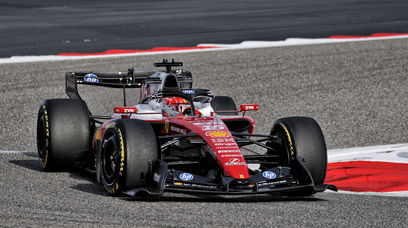Haas Team Principal Guenther Steiner has backed revisions to the F1 Sprint weekend format, revealing he "couldn't stand" the previous schedule. Sprints were introduced to F1 by virtue of a three-race trial in 2021, with competitors faced with first practice and qualifying on Fridays, second practice and a 100km qualifying sprint on Saturdays which set the grid for Sunday's Grand Prix. But following the first real implementation of the initiative last season and the decision to increase the number of Sprint rounds to six, the F1 Commission confirmed changes ahead of this weekend's Azerbaijan Grand Prix that see a second, shortened qualifying session added to replace FP2, meaning the Sprint is, in effect, a standalone event during the schedule. Casting his judgement over the changes, Steiner targeted the now-dropped second practice session when speaking to media, including RacingNews365.com . "I think it is good - the Saturday session from last year, I couldn't stand it and if I can't stand it, how do you think a fan will feel about it," said Steiner. "We have got a practice session where we cannot make any changes to the car, we cannot try to go quicker, we just do laps to find out how the tyres work - very interesting, then we go racing knowing how the tyres work. "Then if the tyres don't work, you can't do anything about it anyway. So you find out on Saturday if you would be crap on Sunday, what's good with that? "I think we would be better if we do something people want to watch, at least it is interesting, at least I get excited about going qualifying."
No systematic thinking
With the Sprint no longer contributing to the grid for Grands Prix, the narrative has focused on drivers now being encouraged to take more risks on track rather than worrying about a knock-on effect for the weekend should they be involved in an incident. But with Aston Martin joining Red Bull, Mercedes and Ferrari to create a 'top four' in the Constructors' Championship and only the top eight positions scoring points in the sprint, Steiner was asked whether there was any need to take a risk for smaller teams with points likely not on offer. "I don't think there is this much systematic thinking to say 'I am not going to go fast because it doesn't mean anything'," replied Steiner. "A perfect example is Brazil last year, if you are on a day where the opportunity arises but you have given up before, how can you get something? You can have a Sprint race where there is mayhem at the front and you can still get points, so you need to race even if you are behind the top four teams. "If you decide you don't want to be there if something happens, good for you - maybe you get lucky, maybe not. "But it is all a decision which... I don't think many people in the Sprint race will say 'I will stay at the back so I don't crash my car because I cannot make the points anyway' and then all of a sudden something happens like Australia and one of the teams outside the top four scores four or six points. If I would have fought for it, I could have maybe got them. "So my approach is always try to do your best, you never know what will come but if you are not there when there is points given, don't say nobody told me not to be there. "Maybe people do this consciously, we didn't so I cannot speak for the others. On Saturday morning, we have something to race for, that is more important. "Everybody can decide if they want to take risks or not, it is not down to me to say what others do."
Most read







